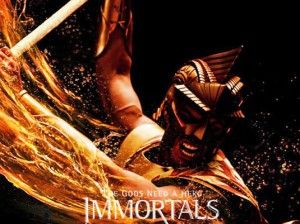Like a series of fantastic Renaissance-style paintings depicting ancient Greek myths, “Immortals” comes to life in 3-D, reminiscent of “300,” but certainly no knock-off like “Clash of the Titans.”
Directed by Tarsem Singh (“The Cell,” “The Fall”), the film feels like much of his other works, filled with beautiful and complex images and special effects, and a not-so-special script to complement it. The artistic genius of Singh cannot be denied, however; his storytelling leaves quite a bit to be desired.
Mickey Rourke stars as the ruthlessly violent King Hyperion, along with the impressive-bodied Henry Cavill, who plays Theseus; the two go head-to-head in a story that won’t please myth purists and historians but will dazzle simpler audiences or those who appreciate aesthetics. The film takes place in a computer-generated Greece that becomes host to the conflict between the gods and the Titans, as well as the conflict between King Hyperion and all who stand between him and his prized treasure.
Also starring the beautiful starlet Freida Pinto as the Sybeline Oracle, Kellan Lutz as Poseidon and Isabel Lucas as Athena, the film focuses more on the beauty of its characters than the reality of their experiences. While the Abercrombie models-turned-actors portray gods, the veteran actors like Mickey Rourke and John Hurt simply phone it in. There are times when Singh’s grand sentiment tries desperately to make its voice clear, dwelling on man’s need for God and God’s response that free will prevents a union of God and man in the mortal world. The lofty ideals of fate and free will are delivered, but not successfully. Singh fails to articulate any ideas; behind a lazily acted, action-packed plot is the mere throwing together of attractive models in front of some pretty backdrops, ultimately failing to produce anything with any substance.
It is the beginning of time, and the gods have warred against the Titans and banished them to Tartarus. The evil King Hyperion wants to free these Titans by finding a magic bow and extracting unexplained vengeance on the gods. Theseus, a man of virtue, stands in his way and joins the sexy virgin oracle that is haunted by visions of the clash of the gods and the Titans. The plot seems to include details on a whim and clutters up the plot with new characters that show up, only to be brutally tortured or killed. Meant to be sentimental, it comes off as cheap and unattached. The violence holds little weight, and instead becomes simply gross to witness. The gods eventually intervene because of Hyperion’s brutality, and what takes place next is a series of beautifully-shot action sequences between the gods, Hyperion, the Titans and the good guys.
Singh takes many artistic liberties, choosing not to remain consistent with Greek mythology, and instead draws from multiple stories such as the founder myth of Theseus as well as the Titanomachy where the Titans face off against the gods. Instead of a grand display of the gods’ might and the Titans’ evil, the battle more closely resembles the conflict of wolves vs. vampires in “Twilight.” What is tragic about this epic retelling of Greek myths through modern CGI and special effects is the glimmer of a vigilante-turned-war-hero cliche that remains entirely inorganic through the film.
Tarsem Singh focuses on his lighting, CGI, make-up and costumes, while completely ignoring every other aspect of telling the story. With action sequences inspired by “300” and other Snyder flicks, mixed with the dream-like images that Singh’s style calls for, the film does indeed redeem itself, but it will not satisfy any intellectual or emotional needs the audience may have.
However, with vivid golds and reds alongside the gorgeous but morbid CGI cliffs, Singh’s raw sense of imagery is unrivaled. But other films like “300” or “Watchmen” that use similar imagery make this film’s not-so-Shakespearean plot look simplistic and disastrous, merely relying on visuals. This is not enough to keep “Immortals” afloat. Singh’s “The Fall” and “The Cell” have their place in cinematic history as great accomplishments both visually and as narratives, but “Immortals” will be nothing but a blip on the radar in this new era of visually stunning films augmented by technological improvements that can only aid special effects, not storylines.


